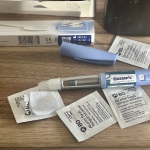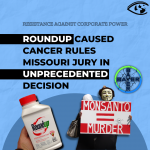US: California Accuses Drug Companies of Fraud
LOS ANGELES, Aug. 25 - The attorney general of California sued 39 drug companies on Thursday, accusing them of bilking the state of hundreds of millions of dollars by overcharging for medicines.
Attorney General Bill Lockyer charged that the drug makers, including some of the world's leading pharmaceutical concerns, defrauded the state's Medi-Cal system for at least the past decade. Mr. Lockyer said the drug manufacturers charged Medi-Cal as much as 10 times the price for some drugs as they charged others, like private pharmacies and hospitals.
Medi-Cal is the state's version of the federal Medicaid program for the poor, which is jointly financed by the states and the federal government. Drug costs account for about $4 billion of Medi-Cal's $34 billion annual budget.
"We're dragging these drug companies into the court of law because they're gouging the public on basic life necessities," Mr. Lockyer said at a news conference here. "This scheme has cost California taxpayers potentially hundreds of millions of dollars and is jeopardizing the public health by diverting money away from patient care."
Mr. Lockyer said that each of the companies made as much as $40 million a year in illegal profits. He said he hoped to recover that amount plus the triple damages allowed under the state's false claims act.
Thursday's legal filing amends a 2003 suit against two drug companies, Abbott Laboratories and Wyeth Pharmaceuticals, to add about three dozen new defendants, including Amgen, Baxter Healthcare, Bristol-Myers Squibb, GlaxoSmithKline, Mylan Laboratories, Novartis and Schering-Plough. It was immediately consolidated in federal court in Boston with similar litigation filed by more than 10 other states and localities, including New York, Texas, Florida and Illinois.
Officials at several drug companies declined to comment.
Mary Anne Rhyne, a spokeswoman for the American subsidiary of GlaxoSmithKline, Europe's largest pharmaceutical company, said that the prices Medi-Cal and other state Medicaid operations pay were standardized and approved by the government. Ms. Rhyne did not deny that different end-users pay widely varying prices for medicines, but said the prices were negotiated with the government and other buyers.
"We follow the law, and we follow government guidelines," she said. "They are fully aware that the government bases payment on the average wholesale price, which represents one of several starting points for negotiation of a reimbursement."
The suit originally arose from a whistle-blower lawsuit filed in 1998 by a Florida pharmacist, who noticed wide discrepancies in prices charged by drug manufacturers. California joined that suit in 2003 and expanded it on Thursday after more investigation. The pharmacist, John Lockwood of Ven-A-Care, a home health care company in Key West, Fla., appeared at the news conference with Mr. Lockyer. "These drugs are far too important to everyone in this country to allow this kind of fraud scheme to continue," Mr. Lockwood said.
California officials cited as an example a pint bag of saline solution used as an intravenous drip manufactured by Abbott Laboratories. The lowest price available to health care providers was 95 cents, the officials said. Medi-Cal was charged $9.78 for the same item.
"We have an ocean of it," Mr. Lockyer said. "It's called saltwater."
Mr. Lockyer held up a bottle of 50-milligram tablets of Atenolol, a generic high blood pressure treatment manufactured by Mylan Laboratories, for which the state paid $804.70. A pharmacy chain pays $33.85 for the same bottle, he said.
Mr. Lockyer acknowledged that the Medi-Cal system might not always be the most prudent buyer of pharmaceuticals and other medical services. But he said that did not let the drug companies off the hook for what he called an elaborate scheme of fixing prices.
"I wish there had been more aggressive negotiations along the way," Mr. Lockyer said. "Now we have to clean up after the elephant."
- 122 Pharmaceuticals



